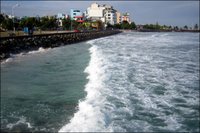
A Paradise Drowning
By Nicholas D. Kristof
The New York Times
Kristof attacks the grave threats to our environment due to irresponsible environmental policies in the U.S. - the world's leading source of greenhouse gases - and other major carbon emitters. Hear hear!
When President Bush visits India next month, he should add a whistle-stop at this gorgeous chain of tropical islands southwest of India, for they are a window into the future if we continue to spew carbon into the environment.
These palm-lined islands, where colored fish and small sharks play in the coral reefs, are a paradise. But old-timers point to myriad changes wrought by the rising seas, and the government is already moving some inhabitants from the lowest atolls to those that are a bit more elevated.
Alas, the high point in this entire nation of 1,200 islands is only eight feet above sea level. So people here worry that eventually the entire nation may have to move, making the Maldives perhaps the first country in the world to be destroyed by global warming. (Tuvalu and Kiribati, both small Pacific island nations, are other contenders for the title of the first modern nation to be drowned.)
"There is a realistic threat that we could be the first environmental refugees in the world," said Mohamed H. Shareef, the chief government spokesman.
He notes that some scientific models have suggested that the seas may rise in this century by two or three feet, as polar ice caps melt and seawater warms and expands. He adds, "As 75 percent of the total land area of the Maldives is under three and a half feet, our islands would be submerged to such an extent that we would have to relocate."
The tsunami a year ago offered a glimpse of what may come: when the waters reached their peak, most of the Maldives disappeared under the Indian Ocean for a few minutes.
One reason for Mr. Bush to drop by is that the Maldives may be the most pro-American Muslim country in the world. Local tolerance and pragmatism are exemplified by the attitude toward liquor: don't drink it, but overcharge foreigners for it.
But the more important reason for Mr. Bush to come is not geopolitical but environmental. He should witness a paradise that is gravely threatened by irresponsible environmental policies in the U.S. - the world's leading source of greenhouse gases - and other major carbon emitters. As evidence mounts that climate change is real, is caused by humans and is accelerating because of feedback loops in nature, I find it astonishing that the U.S. still refuses to adopt serious measures to curb greenhouse gases.
Granted, there is considerable uncertainty about the scale of the damage we are inflicting on the earth. But that's no reason to play Russian roulette with our biosphere.
So we must encourage conservation and fuel efficiency, support alternative forms of energy like wind, solar and biofuels, and - I'll get hate mail about this - grudgingly accept nuclear power, because it doesn't produce greenhouse gases. We should also adopt a carbon tax, and join the Kyoto process of binding curbs on emissions.
A visit to the Maldives is sobering because it juxtaposes extraordinary beauty and extraordinary fragility. The islands have perfect white sand beaches, and the most exclusive resorts here charge several thousand dollars per room per night. And yet the luxury rooms are on sandbars barely peeking above the horizon. When the tide is coming in, you have the creepy feeling that unless it stops very quickly, you'll be left treading water in the middle of the Indian Ocean.
Local people say that the rising seas have already led to severe erosion on some islands, to wells filling with saltwater, and to storms' becoming more violent.
"My island sits lower in the water now, because of rising seas," said Hasan Ibraahim, a fisherman from the island of Kandholhudhoo. Twice a year, he said, waves now wash over the island - and so, after the tsunami, the government decided to relocate the island's entire population.
He's sad to say goodbye to the land of his ancestors, but after the tsunami it was three days before he found his 8-year-old daughter and 5-year-old son - and he doesn't want to live through that nightmare again.
So Mr. Bush should come and talk to fishermen who endure the mutating climate every day - and then he should ponder the implications of rising seas for Florida, the Carolinas, Long Island. The Maldives may be the canary in the world's coal mine.
"Our message to the U.S. is as simple as this," said Mr. Shareef, the government spokesman. "Sea level rise is not just a phenomenon which is just going to engulf the Maldives and then stop. If it affects us tomorrow, it will affect you the day after."
Photo credits: (1) Nicholas D. Kristof. (Fred R. Conrad/The New York Times) (2) Rising sea levels threaten to inundate the Maldive Islands. (Naka Nathaniel/NYTimes.com)


No comments:
Post a Comment